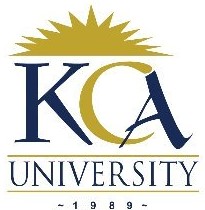 UNIVERSITY EXAMINATIONS: 2016/2017
UNIVERSITY EXAMINATIONS: 2016/2017
EXAMINATION FOR THE DEGREE OF BACHELOR OF
SCIENCE IN INFORMATION TECHNOLOGY
BIT2209 RESEARCH SKILLS AND DESIGN
FULL TIME/PART TIME
SPECIAL/SUPPLEMENTARY EXAMINATION
DATE: JULY, 2017 TIME: 2 HOURS
INSTRUCTIONS: Answer Question One & ANY OTHER TWO questions.
QUESTION ONE (30 MARKS)
a) Describe what is hypothesis (2 Marks)
b) Briefly explain two types of hypothesis. Give an example for each case (4 Marks)
c) Consider the following research topics
i) Use of ICT in supporting education in KCA University
ii) Internet Access in KCA University
iii) Mobile phones access in KCA University
Explain the interplay between the following Research components
Problem statements
Proposed solution
Research objectives
(6 Marks).
d) Distinguish between secondary and primary data. Give examples to illustrate
your answer (4 Marks)
(e) State and explain Four types of sampling methods (4 Marks)
(f) Describe the meaning of the term “research” (2 Marks)
(g) Discuss the difference between the following research concepts. Use one
example to illustrate each concept
i) Sample and population (4 Marks)
ii) qualitative data and quantitative data (4 Marks)
QUESTION TWO (20 MARKS)
(a) Explain the following Research Concepts (10 Marks)
i) Research proposal
ii) Research Process
iii) Research Skills
iv) Research question
v) literature review
(b). Outline a typical Structure of a Research Proposal. (10 Marks)
QUESTION THREE (20 MARKS)
a) Discuss Research Ethics
(10 Marks)
b) What are some of some of the unethical practices that you may encounter
while doing Research? How can you avoid the falling prey to these
practices? (10 Marks)
QUESTION FOUR (20 MARKS)
a) Why is a review of literature important in undertaking scientific research?
(15 Marks)
b) What is meant by phrase “SMART Objectives”
(5 Marks)
QUESTION FIVE (20 MARKS)
Using specific examples in computing and Information Technology research,
discuss the following research approaches;
a) Survey Research
b) Experimental Research
c) Descriptive research
d) Exploratory Research
(20 Marks)
